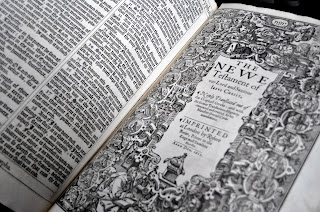September 25th 2016 marked the start of this year's Banned Books Week, an annual event organised by the American Library Association (ALA) which aims to highlight the issue of censorship and celebrate the freedom to read. The event has developed in response to the ALA log of challenges an complaints made about books held in the libraries of their members, including decisions to withdraw certain books from circulation. Although American in outlook, Banned Books Week serves as an international reminder of literary censorship, which remains an important topic today.
 |
York Minster Library’s 1793 printing of
'The Trial of Thomas Paine' 1 |
 |
| A 1940 edition of Of Mice and Men 2 |
 |
| Alice conversing with the Cheshire Cat 3 |
For the ALA, the majority of these challenges to books come from libraries in educational institutions, particularly high schools. A common trend is the parents of students pressurising library and teaching staff to remove various books from the library and the syllabus. Reasons for objecting range from feeling the book is inappropriate for the age group, to the use of swearing, or the inclusion of sexual content. Another common theme is for objections made on religious grounds, both in educational and public libraries.
Religious belief and censorship have a long and uneasy past, reflected in the wide collections of York Minster. York Minster Archives hold a Wycliffite Bible - a rare copy of the New Testament in English, produced before full translations from Latin were sanctioned in Britain. Its rarity is in part due to the fact that any such texts discovered by the authorities were burned. York Minster Library holds a multitude of editions of the Bible, with authorised editions produced by Church and State in conjunction and officially issued to churches. Probably the most famous of these translations is the King James Bible, issued as the authorised Bible for Church of England use in 1611 and remaining a popular and influential translation today.
 |
| 1611 edition of the King James Bible 4 |
This serves as an important reminder of the ongoing issues of literary censorship. Artists, writers and journalists have been imprisoned this year in Egypt, Iran and Singapore. But not just the authors are at risk - those who work in libraries can also face punishment for maintaining intellectual freedom for their library users. Ukrainian librarian Natalya Sharina has been under house arrest since October 2015, imposed by Russian authorities for introducing supposedly extremist Ukrainian literature to the library. The campaign for her release is ongoing.
Thankfully, the novels highlighted by Banned Books Week are easily accessed in the UK today. We face fewer challenges to library content than our colleagues in the US. Here, literary censorship is largely a thing of the past. But Banned Books Week serves as an important reminder of the historic role of censorship and the high price for free speech still being paid by so many around the world today.
Further detail of the images:
1. Title page of York Minster Library’s 1793 printing of The Trial of Thomas Paine for certain false, wicked, scandalous and seditious libels, inserted in the second part of the Rights of Man. For many, his political ideas were as contentious as the supposed libels.
2. A 1940 edition of Of Mice and Men, which once belonged to Archbishop Garbett. This work is one of the most complained about novels of the twentieth century.
3. The classic John Tenniel illustration of Alice conversing with the Cheshire Cat - talking with animals being something which angered some Chinese censors. This image is of a 1925 Macmillan edition.
4. The title page of a 1611 edition of the King James Bible, one of many attempts to officially control translation and dissemination of Holy texts.
No comments:
Post a Comment
Anybody can comment on this blog, provided that your comment is constructive and relevant. Comments represent the view of the individual and do not represent those of The University of York Information Directorate. All comments are moderated and the Information Directorate reserves the right to decline, edit or remove any unsuitable comments.